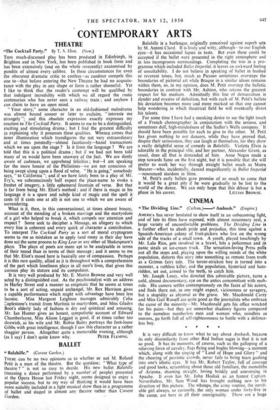BALLET
Balabille." (Covent Garden.) MERE can be no two opinions as to whether or not M. Roland Petit is a man of the theatre. But the question: " What type of theatre ? " is not so easy to decide. His new ballet Balabille (meaning a dance performed by a number of people) presented at the Opera House last Friday night, seems designed to enjoy a popular success, but to my way of thinking it would have been more suitably included in a light musical show than in a programme of ballet and staged in almost any theatre rather than Covent Garden. Balabille is a burlesque, originally conceived against superb sets by M. Antoni Clave. It is lively and witty, although—to our English eyes—it has occasional lapses in taste. But even these could be accepted if the ballet were presented in the right atmosphere and in less incongruous surroundings. Completing the trio in a pro- gramme which included Ballet Imperial, it leaves an awkward feeling of unsuitability. I do not believe in speaking of ballet in hushed or reverent tones, but, much as Picasso sometimes oversteps the boundaries of pictorial art while Braque in a similar idiom remains within them, so, in my opinion, does M. Petit overstep the balletic boundaries in contrast with Mr. Ashton, who retains the greatest respect for his medium. Admittedly this line of demarcation is slender and evasive of definition, but with each of M. Petit's ballets his deviation becomes more and more marked so that one cannot help wondering in which theatrical field he will eventually direct his talents.
For some time I have had a sneaking desire to see the light touch of a French choreographer in conjunction with the serious, and sometimes dull, high-mindedness of the Sadler's Wells company. ' It should have been possible for each to give to the other. M. Petit has given nothing to our dancers, while they have proved that, despite their seriousness, they can laugh at themselves, for they show a really delightful sense of comedy in Balabille. Violetta Elvin is adorable in the principal role, and her partner, Alexander Grant, as usual, does all that is demanded of him. Anne Negus made a step towards fame on the first night, but it is possible that she will prefer to work her way through straight ballet much as Moira Shearer—who, incidentally, danced magnificently in Ballet Imperial —renounced stardom in films.
M. Petit's early ballets gave promise of so much to come that it would be a great pity if he were gradually to be lost to the world of the dance. We can only hope that this detour is but a






































 Previous page
Previous page